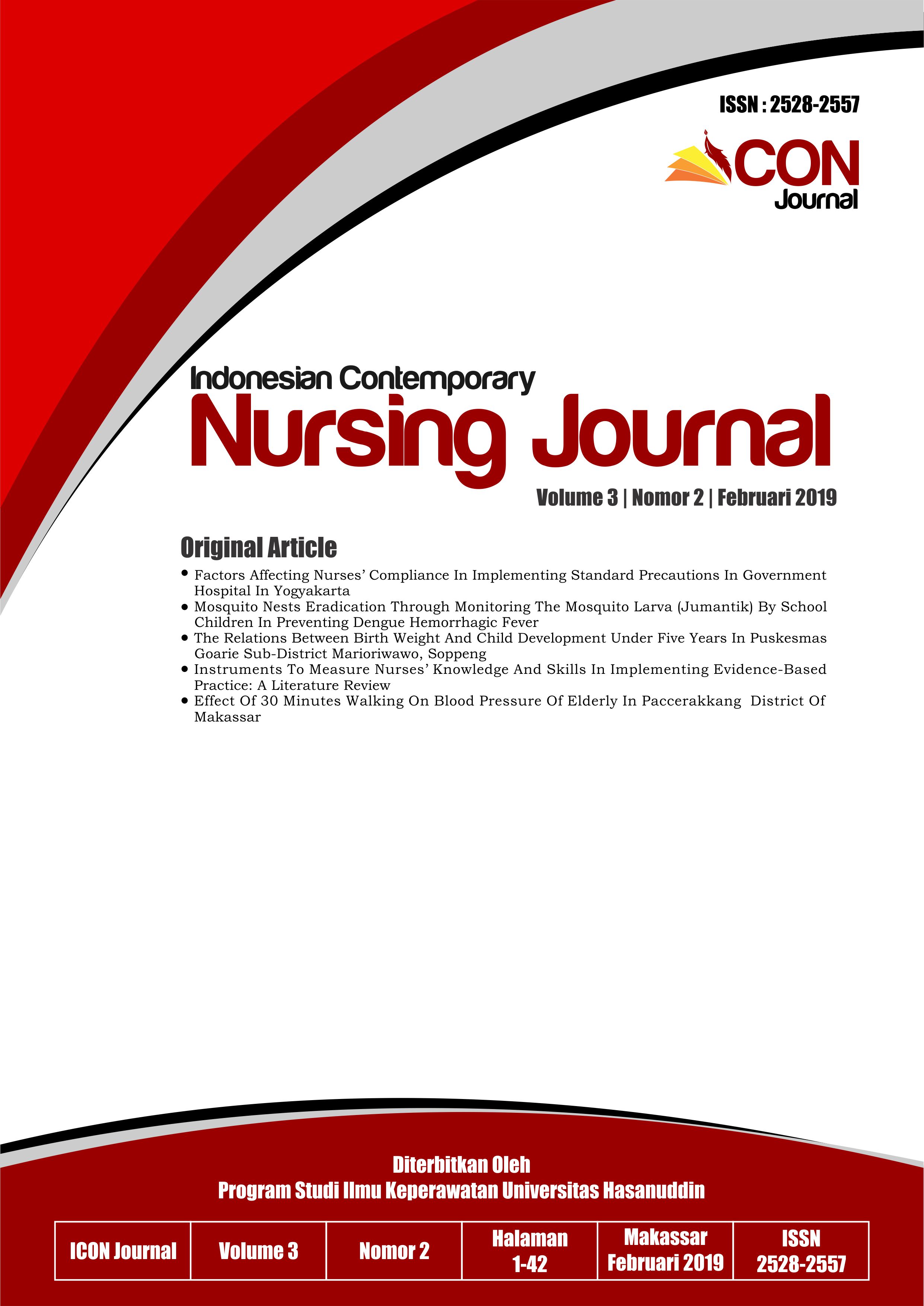Factors Affecting Nurses’ Compliance in Implementing Standard Precautions in Government Hospital in Yogyakarta
Abstract
Background:Nosocomial infection is infections that occur in patients when they are hospitalized. Data in several countries found that hundreds of millions patients worldwide are exposed to nosocomial infection each year. Standard precautions are applied to prevent infections in the hospital. The results of observations and interviews on nurses at Wates Regional Public Hospital found non-compliance of nurses in implementing standard precautions.Objective:The aim of this study is to determine factors affecting nurses’ compliance in Wates Regional Public Hospital, Yogyakarta.Method: This was cross sectional study, using questionnaire and standard precautions compliance check list. Observation was conducted twice on june 26th to July 7th, 2018. The subjects were 103 nurses in 10 inpatients room, taken by total sampling. Data was analyzed by pearson, spearman and mann whitney u test as bivariate, and also linier regression as multivariate.Result:The result of this study indicate that there were significant relationship between gender, standard precautions knowledge, motivation and work experience with nurses’ (p < 0,05), while there were insignificant relationship between age, education level, attitude, risk perception, preventive efficacy, risk taking personality, needle punctured experience, workload, infection knowledge, work stress, obstacles in standard precautions, the availability of personal protective equipment, safety climate and safety performance feedback with nurses’ compliance (p > 0.05). Multivariate test indicate that motivation has a dominant influence on nurses’ compliance.Conclusion and Suggestion: Factors influencing nurse compliance with standard precautions include motivation, work experience and risk taking personality. The dominant factor influencing nurse compliance with standard precautions is motivation. Suggestions from this study are to improve the completeness of facilities and tools related to standard precautions, monitoring and evaluation of nurses’ compliance. Further study needs to be held related to standard precautions each component include hand washing, personal protective equipment usage, care equipment decontamination, safe injecting practices, sharp objects and waste management.Key words:nosocomial infection, compliance to standard precaution, Wates Regional Public Hospital 1: Wates Regional Public Hospital2: Master in Nursing, Faculty of Medicine, Public Health and Nursing UGMDownloads
Download data is not yet available.
Dimensions
Published
2019-02-13
How to Cite
Sagita, R. W., Pangastuti, H. S., & Alim, S. (2019). Factors Affecting Nurses’ Compliance in Implementing Standard Precautions in Government Hospital in Yogyakarta. Indonesian Contemporary Nursing Journal (ICON Journal), 3(2). https://doi.org/10.20956/icon.v3i2.4972
Issue
Section
ARTICLES
Copyright & Licensing
Authors who publish with this journal agree to the following terms:
Authors retain copyright and grant the journal right of first publication with the work simultaneously licensed under a Creative Commons Attribution License that allows others to share the work with an acknowledgement of the work's authorship and initial publication in this journal.
Authors are able to enter into separate, additional contractual arrangements for the non-exclusive distribution of the journal's published version of the work (e.g., post it to an institutional repository or publish it in a book), with an acknowledgement of its initial publication in this journal.
Authors are permitted and encouraged to post their work online (e.g., in institutional repositories or on their website) prior to and during the submission process, as it can lead to productive exchanges, as well as earlier and greater citation of published work (See The Effect of Open Access).
Authors retain copyright and grant the journal right of first publication with the work simultaneously licensed under a Creative Commons Attribution License that allows others to share the work with an acknowledgement of the work's authorship and initial publication in this journal.
Authors are able to enter into separate, additional contractual arrangements for the non-exclusive distribution of the journal's published version of the work (e.g., post it to an institutional repository or publish it in a book), with an acknowledgement of its initial publication in this journal.
Authors are permitted and encouraged to post their work online (e.g., in institutional repositories or on their website) prior to and during the submission process, as it can lead to productive exchanges, as well as earlier and greater citation of published work (See The Effect of Open Access).

